Low Carbon Concrete Track Slab With BarChip Fibre Concrete Reinforcement
BarChip macro synthetic fibre helped Parramatta Light Rail deliver world-class low carbon concrete track slab, reducing the carbon footprint by 4,815 tonnes of CO2e, reducing labour costs by 15% and helping Parramatta Connect achieve the highest ever ‘As-Built’ IS score from the Infrastructure Sustainability Council.
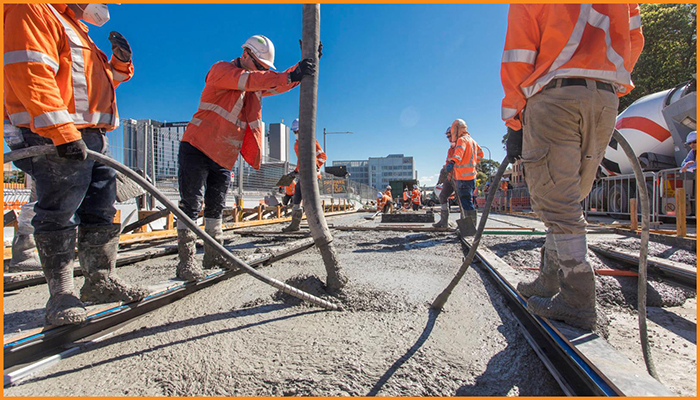
Placing BarChip Reinforced Track Slab – a NSW First
Parramatta Connect, a 50:50 joint venture between Downer and CPB Contractors was awarded the contract to deliver the Stage 1 infrastructure works for the Parramatta Light Rail, which included the 12km two-way light rail track and supporting works. From the very beginning, they were committed to Sydney’s guiding infrastructure principles – Liveability, Productivity and Sustainability. CPB Sustainability Manager Deborah Romero explains;
“Sustainability was a key focus for CPB Contractors and Downer throughout the tender process, with multiple sustainability initiatives embedded very early on. These initiatives included the use of macro synthetic fibres within the track slab to replace steel reinforcement, which was realised throughout the design and delivery of the light rail.”
The design team focused heavily on the social and environmental outcomes of the project, which included replacing steel reinforcement in the track slab with BarChip macro synthetic fibre – a NSW first. The approach was rewarded with a ‘Leading’ award for the Design and As-Built Rating for the Infrastructure Package of PLR Stage 1 by the Infrastructure Sustainability Council.
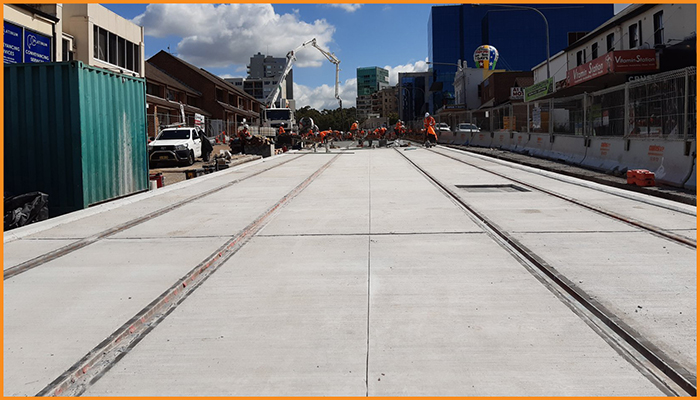
Finished Low Carbon Concrete Track Slab – Parramatta Light Rail
BarChip Fibre Reinforced Low Carbon Concrete Trackslab
The Parramatta Light Rail has a 100-year design life and was originally specified with a steel reinforced concrete track slab. The opportunity for a low carbon concrete track slab, better durability and reduced costs led the project team to consider an alternative design with BarChip fibre reinforced concrete. The primary design of the Parramatta Light Rail comprised a lean-mix low-carbon concrete sub-base, on top of which the track rails were pre-installed. Following this, the rail is encapsulated with a second layer of concrete.
Traditionally, steel bar reinforcement is used to reinforce this encapsulation layer. However, this process is hugely time-consuming and presents logistical problems from placing bars at close centres in such a confined environment. Steel bars can also cause unwanted conductivity from the rail, potentially causing corrosion of steel infrastructure which negatively impacts design life. Using BarChip macro synthetic fibre as a replacement for steel bar eliminated any risk of corrosion, reduced the risk of stray current affecting the steel reinforcement within the track slab and enabled a more efficient construction process. By removing the need to install steel reinforcement in the track slab, Parramatta Connect was able to reduce labour costs by approximately 15% and significantly reduce overall construction time.
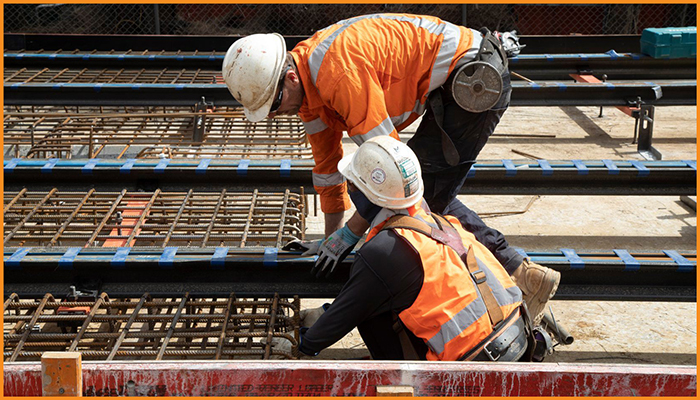
Forming Steel Bar In Confined Spaces is Labour Intensive
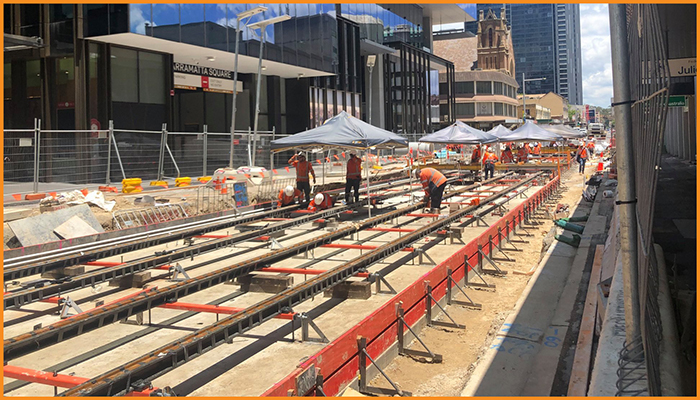
Tracks Ready for Encapsulation with BarChip Reinforced Concrete With No Steel Bar Needed
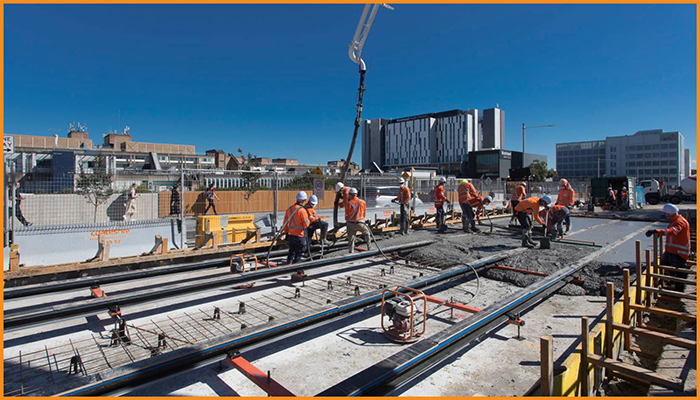
Placing BarChip Fibre Reinforced Low Carbon Concrete Track Slab
Environmental Outcomes With BarChip Fibre Reinforced Concrete Trackslab
BarChip significantly reduces the volume of steel required in track slab construction, reduces lifetime maintenance costs by eliminating the risk of corrosion and improves concrete durability. These benefits deliver immediate and ongoing carbon savings to the project and support the 100-year design life.
Parramatta Light Rail selected BarChip R50 macro synthetic fibre. R50 is popular in global markets due to its high performance, easy mixing and finishing qualities, and because it’s manufactured with recycled and repurposed plastics. BarChip R50 is supported by a fully verified Environmental Product Declaration (EPD), allowing accurate determination of embodied CO2e savings that were achieved through the BarChip reinforced design. Deborah Romero explains:
“The project poured over 20,000 m3 of concrete with 101 tonnes of BarChip R50, which reduced the quantity of steel reinforcement required within the track slab structure by 2,426 tonnes. The availability of the EPD by BarChip allowed the project to accurately quantify the embodied carbon of the fibre and conclude that the initiative equated to a GHG emission reduction of 4815.83 tonnes of CO2e specifically due to the removal of steel reinforcement. Overall, this contributed to a State First Innovation for the project contributing 1 ISC Innovation point and contributed to the overall achievement of a 28% reduction in embodied carbon emissions in materials use.”
Using BarChip supports environmental outcomes beyond direct carbon reductions. BarChip is delivered ready-mixed within the concrete, eliminating the need to transport steel reinforcement which further reduced carbon emissions by ~4 tonnes of CO2e. Compared to the original design, the use of BarChip within the track slab reduced freshwater consumption in material manufacturing by over 96% and reduced non-renewable energy consumption by over 86%. BarChip is also provided in recycled paper bags which are used in their entirety within the concrete mixing process, minimising the packaging waste of the product. BarChip also helped reduce overall construction time which in turn led to an improved social outcome through reduced disruption in the local community.
